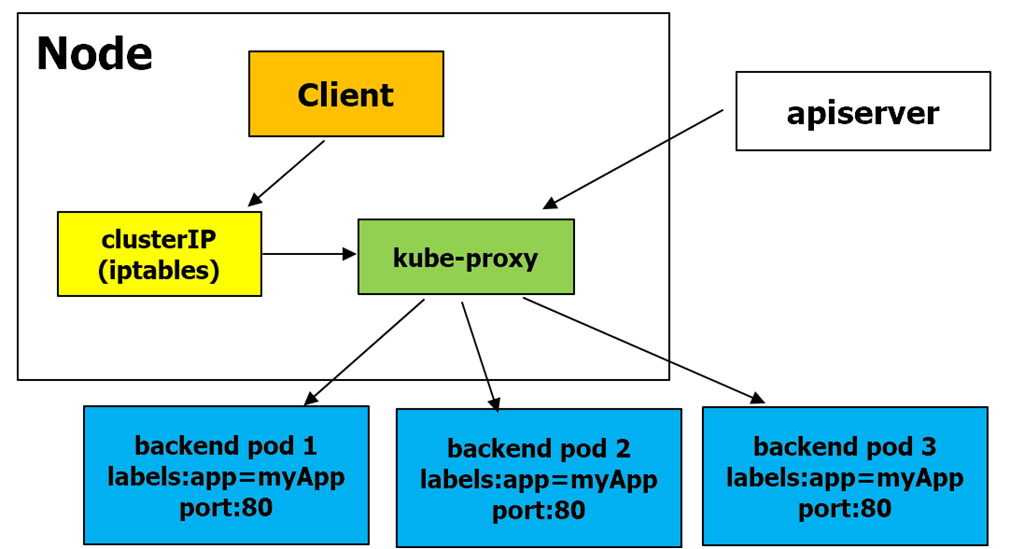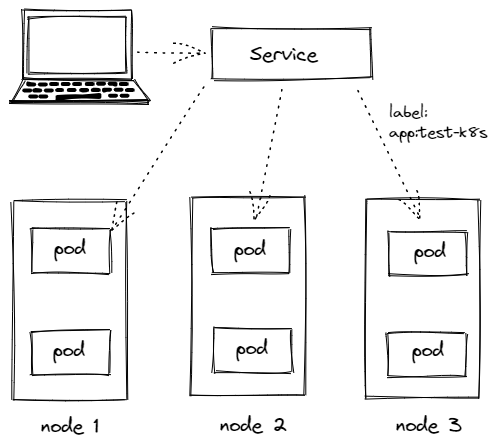Kubernetes-Service的使用
特性
- Service 通过 label 关联对应的 Pod
- Servcie 生命周期不跟 Pod 绑定,不会因为 Pod 重创改变 IP
- 提供了负载均衡功能,自动转发流量到不同 Pod
- 可对集群外部提供访问端口
- 集群内部可通过服务名字访问
创建Service
创建 一个 Service,通过标签test-k8s跟对应的 Pod 关联上service.yaml
1 | apiVersion: v1 |
部署 Service
1 | # 首先创建 deployment |
查看 Service
1 | # 查看 service |
查看 Service 详情
1 | # kubectl describe svc SERVICE-NAME |
解释说明:
Endpoints:可以发现 Endpoints 是各个 Pod 的 IP,也就是他会把流量转发到这些节点。Type:服务的类型,可以为 ClusterIP NodePort LoadBalancer
对外暴露服务
ClusterIP
服务的默认类型是ClusterIP,只能在集群内部访问ClusterIP:
修改一下
service.yaml中的 type ,并且去掉 最后一行nodePortservice.yaml1
2
3
4
5
6
7
8
9
10
11
12
13
14
15
16
17
18
19apiVersion: v1
# 制定类型为 Service
kind: Service
metadata:
# 服务的名称
name: test-k8s
spec:
# 标签 ,要与 pod的标签对应上,否则关联不起来
selector:
app: test-k8s
# ClusterIP:集群内可访问 (默认)
# NodePort:节点可访问
# LoadBalance:负载均衡模式(需要负载均衡才可用)
type: ClusterIP
ports:
- port: 8090 # 本 Service 的端口
targetPort: 8080 # 容器端口
# nodePort: 31000 # 节点端口,范围固定 30000 ~ 32767重新部署一下
1
2
3
4
5
6
7
8
9
10
11
12
13
14
15
16
17
18
19
20
21
22
23
24$ kubectl apply -f service.yaml
service/test-k8s configured
$ kubectl get svc
NAME TYPE CLUSTER-IP EXTERNAL-IP PORT(S) AGE
kubernetes ClusterIP 10.96.0.1 <none> 443/TCP 85m
test-k8s ClusterIP 10.107.238.211 <none> 8090/TCP 19m
$ kubectl describe svc test-k8s
Name: test-k8s
Namespace: default
Labels: <none>
Annotations: <none>
Selector: app=test-k8s
Type: ClusterIP
IP Family Policy: SingleStack
IP Families: IPv4
IP: 10.107.238.211
IPs: 10.107.238.211
Port: <unset> 8090/TCP
TargetPort: 8080/TCP
Endpoints: 10.244.0.32:8080,10.244.0.35:8080
Session Affinity: None
Events: <none>可以进入到 Pod 里面访问:
1
2
3
4
5
6
7
8# kubectl exec -it POD-NAME -- bash
$ kubectl exec -it test-k8s-8598bbb8c6-smxnw -- bash
root@test-k8s-8598bbb8c6-smxnw:/app$ curl http://test-k8s:8090
暂时不通--不知道为什么...
root@test-k8s-8598bbb8c6-smxnw:/app$ curl http://10.107.238.211:8090
index page
IP lo10.244.0.34, hostname: test-k8s-8598bbb8c6-smxnw如果要在集群外部访问,可以通过端口转发实现(只适合临时测试用):
如果你用 minikube,也可以这样
minikube service test-k8s来转发服务到本机
NodePort
上面我们是通过端口转发的方式可以在外面访问到集群里的服务,如果想要直接把集群服务暴露出来,我们可以使用NodePort 和 Loadbalancer 类型的 Service
修改 yaml 文件,修改 type 为 NodePort ,并且加上 nodePort 转发端口
重新部署
1
2
3
4
5
6
7
8
9
10
11
12
13
14
15
16
17
18
19$ kubectl apply -f service.yaml
service/test-k8s configured
# 在节点上,我们可以 curl http://localhost:31000/hello/easydoc 访问到应用
# 并且是有负载均衡的,网页的信息可以看到被转发到了不同的 Pod
$ docker ps
CONTAINER ID IMAGE COMMAND CREATED STATUS PORTS NAMES
2afb7bcea2f8 kicbase/stable:v0.0.28 "/usr/local/bin/entr…" 4 days ago Up 3 minutes 127.0.0.1:49157->22/tcp, 127.0.0.1:49156->2376/tcp, 127.0.0.1:49155->5000/tcp, 127.0.0.1:49154->8443/tcp, 127.0.0.1:49153->32443/tcp minikube
$ docker exec -it minikube bash
root@minikube:/$ curl http://localhost:31000/hello/easydoc
hello easydoc
IP lo172.17.0.8, hostname: test-k8s-68bb74d654-ztg6h
root@minikube:/$ curl http://localhost:31000/hello/easydoc
hello easydoc
IP lo172.17.0.9, hostname: test-k8s-68bb74d654-xnxkc如果你是用 minikube,因为是模拟集群,你的电脑并不是节点,节点是 minikube 模拟出来的,所以你并不能直接在电脑上访问到服务
Loadbalancer
Loadbalancer 也可以对外提供服务,这需要一个负载均衡器的支持,因为它需要生成一个新的 IP 对外服务,否则状态就一直是 pendding,这个很少用了,后面我们会讲更高端的 Ingress 来代替它。
1 | $ kubectl get svc |
多端口
多端口时必须配置 name, 文档
1 | apiVersion: v1 |
总结
ClusterIP
默认的,仅在集群内可用
NodePort
暴露端口到节点,提供了集群外部访问的入口
端口范围固定 30000 ~ 32767
LoadBalancer
需要负载均衡器(通常都需要云服务商提供,裸机可以安装 METALLB 测试)
会额外生成一个 IP 对外服务
K8S 支持的负载均衡器:负载均衡器
Headless
适合数据库
clusterIp 设置为 None 就变成 Headless 了,不会再分配 IP,后面会再讲到具体用法
官网文档
Kubernetes-Service的使用

